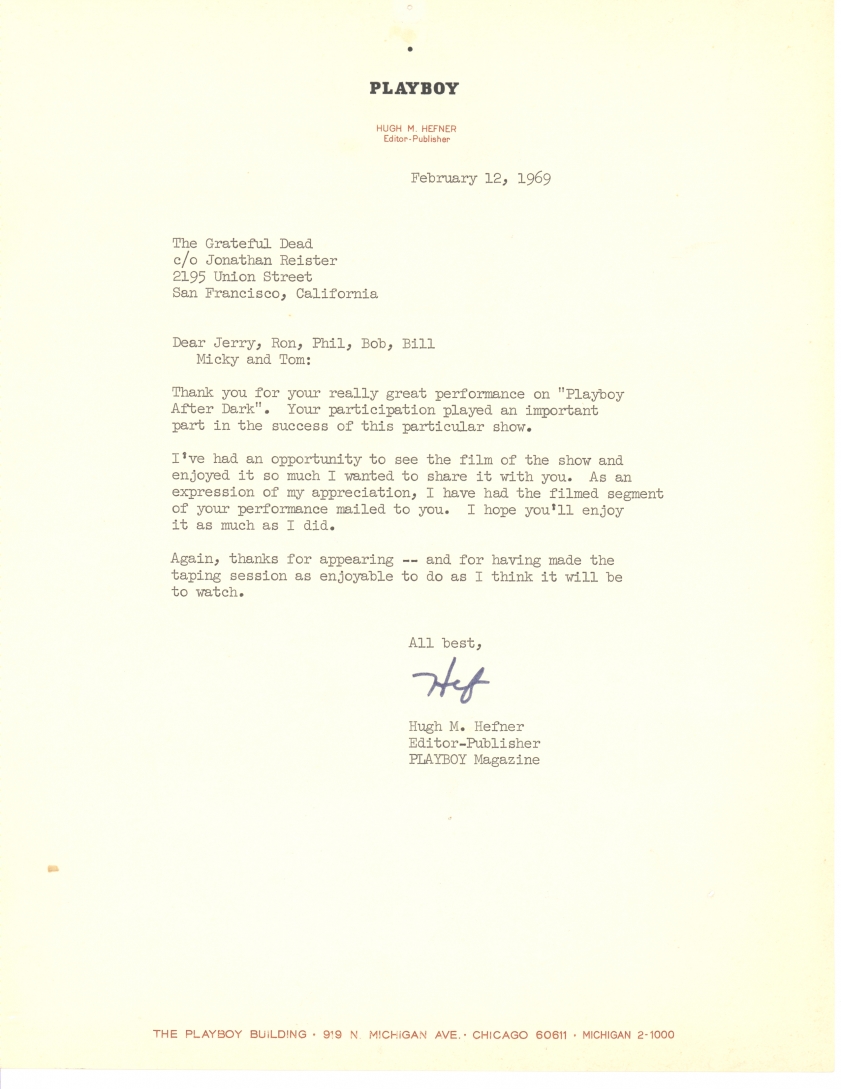When the Grateful Dead Performed on Hugh Hefner’s Playboy After Dark & Secretly Dosed Everyone With LSD (1969)
At one time, whatever else people did with it, they really did read Playboy for the articles. And whatever other vicarious thrills they might obtain from Hugh Hefner’s Playboy’s Penthouse variety show or its follow-up, Playboy After Dark, they definitely tuned in for the music. Guests included Ike & Tina Turner, The Byrds, Buddy Rich, Cher, Deep Purple, Fleetwood Mac, Steppenwolf, James Brown, and many more. On January 18, 1969, the Grateful Dead performed, and it went exactly as one might expect, meaning “things got totally out-of-hand,” Dave Melamed writes at Live for Live Music, “but everything wound up working out just fine.
Things worked out more than fine, despite, or because of, the fact that the band’s legendary sound-man Owsley “Bear” Stanley (at that time the largest supplier of LSD in the country) dosed the coffee pot on set. Dead drummer Bill Kreutzmann tells the story in the Conan clip below. It all started, he says, during soundcheck, when he noticed that the crew was acting “kinda loose.” Knowing Stanley as he did, he immediately suspected the cause: “the whole crew, all of you” he says pointing toward the Conan camera operators, “was high on acid.”
There’s not much evidence of it in the footage. There don’t seem to be any technical problems in the clip at the top. In their brief, jovial interview, Hefner and Garcia seem plenty relaxed. Jerry tells the Playboy founder why the band has two drummers. (They “chase each other around, sort of like the serpent that eats its own tail” and “make a figure in your mind” if you stand between them.) Then he takes the stage and the band plays “Mountains of the Moon” and “St. Stephen.”
Hefner was so appreciative of whatever happened on set that he sent a personal letter of thanks the following month (below), addressed to each member of the band. “Your participation played an important part in the success of this particular show.” He enclosed a film of the performances and expressed his gratitude “for having made the taping session as enjoyable to do as I think it will be to watch.”

Kreutzmann relates some other anecdotes in his 2015 Conan interview, including a funny bit about how the band got its name. But the best part of the appearance is watching him imitate Hefner, who was apparently plastered to the wall by the end of the set, the coffee really starting to kick in.
This strange chapter of Grateful Dead history is one of many memorialized in the new graphic novel, Grateful Dead Origins.
via Laughing Squid
Related Content:
Josh Jones is a writer and musician based in Durham, NC. Follow him at @jdmagness
When the Grateful Dead Performed on Hugh Hefner’s Playboy After Dark & Secretly Dosed Everyone With LSD (1969) is a post from: Open Culture. Follow us on Facebook, Twitter, and Google Plus, or get our Daily Email. And don't miss our big collections of Free Online Courses, Free Online Movies, Free eBooks, Free Audio Books, Free Foreign Language Lessons, and MOOCs.
from Open Culture https://ift.tt/3iAHKew
via Ilumina


Comments
Post a Comment